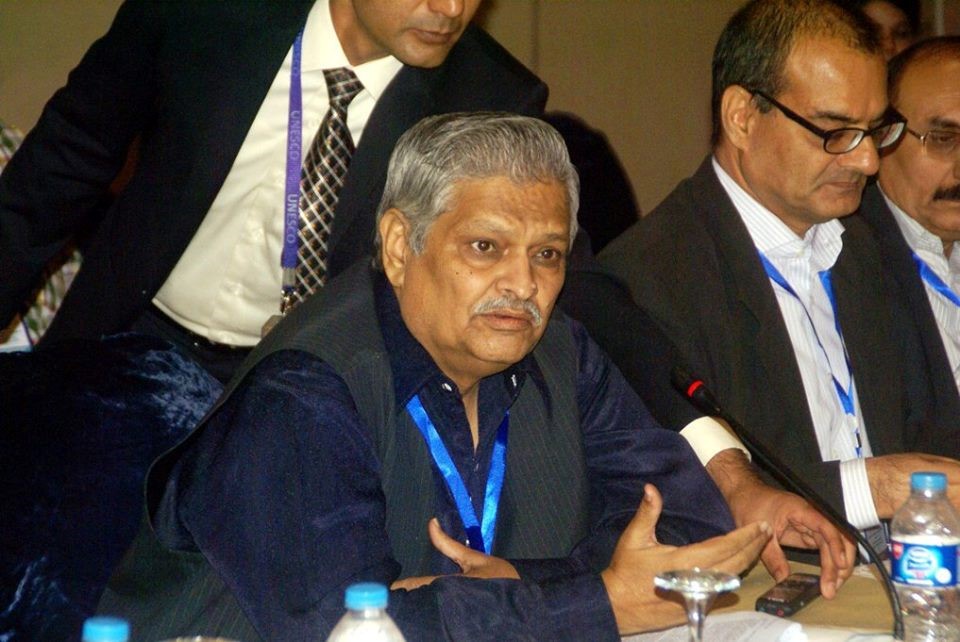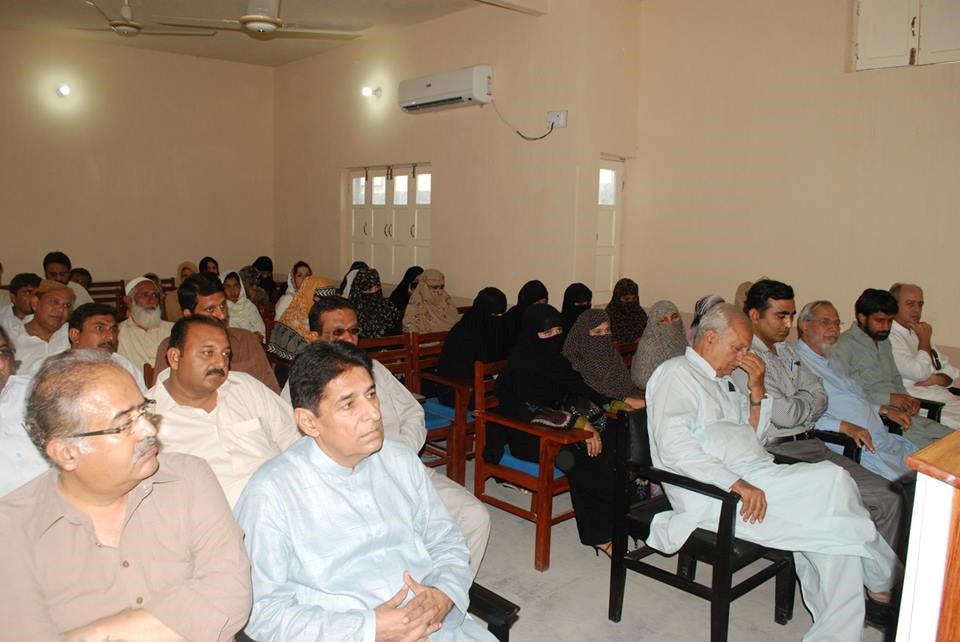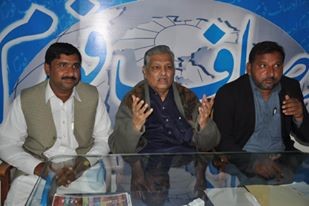Doha Centre for Media Freedom Interview
By: Peter Townson
Journalists working in rural areas in Pakistan still face a wide range of threats to their safety, and while media freedom appears to have improved marginally in the country in recent years, the open conflict between various social factions often places members of the media in dangerous situations.
Doha Centre for Media Freedom spoke to director of the Rural Media Network of Pakistan (RMNP), Ehsan Ahmed Sehar to discuss the situation in rural areas of the country, where the battle to broadcast unbiased, balanced coverage in the media can often place journalists in serious danger.
“Pakistan is one of the most dangerous countries for journalists, where according to our monitoring, 121 journalists were killed between 2006 and 2016, while only nine of the cases were solved,” Sehar said.
“Terrorism, religious extremism, sectarian violence and the alarming security situation are the main problems for rural journalists. They put their lives in danger to cover different assignments without insurance, safety equipment or proper safety training,” added Sehar.
“Religious extremism continues to spread and there are many sectarian organisations fighting for domination,” he noted, adding “drugs and arms mafias, assassins, ethnic groups and other criminal gangs are also active.”
Sehar explained that religious leaders, keen to have their speeches denouncing other sects published in full, will threaten journalists who resist.
“Local religious leadership does not understand that correspondents have no control over editorial policy, and journalists receive threatening text messages from militants – this is a serious matter and deserves immediate action at the highest level.”
Sehar described the different threats facing journalists in certain areas of the country, varying from influential figures harassing journalists who report on honour killing and gang rape incidents, to targeting by the Taliban, other militants and even security agencies. He added that authorities often falsely accuse journalists of various crimes should they carry out work exposing corruption.
Sehar argued that other important constraints on media freedom which impinge on journalists’ ability to do their work, are the cultural of secrecy and the levels of bureaucracy concerning access to official information.
“Journalists find it almost impossible to find information related to large government deals or projects, and ministries remain tight-lipped on their activities and finances, denying access to information for journalists,” noted Sehar.
Similarly, the Pakistan Electronic Media Regulatory Authority (PEMRA) has been used to silence the broadcast media by either suspending licenses or simply threatening to do so. In addition, media houses are also exposed to propaganda from state agencies, pressured by powerful political elements and non-state actors involved in the current conflict to publish what they are spoon-fed.
Urban versus rural threats
While these threats face journalists working throughout Pakistan, Sehar and RMNP are – as their name would suggest – focussed on addressing issues confronted by members of the media working in rural areas.
“Urban-based journalists are paid and have support from their respective media organisations and official publicity departments,” noted Sehar, adding “they are being provided maximum facilities by media owners as a result of the media ownership in the cities.”
“There is no comprehensive system to act when a rural journalist is attacked, kidnapped or tortured. No one is aware of any hotline for assistance,” stated Sehar, adding “rural journalists have no contact with the journalist bodies active in big cities.”
Some rural journalists, also known as district correspondents, are engaged by media organisations for reporting news and views from the rural areas.
“Historically the development of media in Pakistan has taken place in metropolitan centres,” Sehar said, arguing “this is not unique to Pakistan, however what is perhaps different in the Pakistani context is that the development has not filtered down to rural areas.”
As a result, rural journalists remain neglected, often working in isolation with extremely limited support from media organisations in financial, moral and professional terms.
Sehar suggested that journalists themselves need to work together to bridge this gap and fight for their rights and the rights of their colleagues.
Presenting a united front to the authorities, as opposed to a divided and disparate group of journalists from different locations, is essential to combating the many problems facing rural journalists.
Topics deemed off-limits
Unfortunately, caught between the various powers at play in the rural areas of Pakistan, journalists often find themselves facing threats and ultimatums.
“Censorship in Pakistan used to be straightforward. Certain topics were simply off limits,” explained Sehar, arguing “today, the situation is more complicated and more confusing.”
However, there are still a large number of topics which are basically deemed no-go subjects for journalists. These include articles critical of the military or government, investigative reports, and any reporting on the Taliban or other similar groups.
Journalists in rural areas face the same constraints as their colleagues in the city, but also face serious additional issues because of their location and the social differences in those areas.
For journalists in rural areas, corruption, sectarianism, honour killings, gang rape and feudal powers all represent subject matter that can cause serious issues.
Looking to the future
Ranked by Reporters Without Borders as 147th out of 180 countries in the 2016 World Press Freedom Index, Pakistan continues to fail to guarantee press freedom for its people.
Without doubt, more needs to be done to address the serious problems that journalists face on a daily basis as they attempt to bring information about what is happening in rural areas to the wider world.
Sehar made a number of suggestions for how to improve the current situation for journalists, arguing that media
houses should provide safety equipment to all correspondents, irrespective of their location, and that reporters, cameramen and other support staff covering dangerous assignments must be provided insurance cover.
Sehar argued that the widows of journalists killed because of their work should be paid compensation, while assistance for any serious medical injuries incurred in the field should also be provided.
Media houses also have a responsibility to cover instances of journalists being kidnapped, and should ensure that attention remains on these cases until their release is secured.
Sehar suggested that more attention should be paid to specific rural areas where journalists face increased danger, noting that civil society organisations such as RMNP can help identify these hotspots of violence.
He also emphasised the pressing need to improve capacity-building measures for journalists in the field, noting that professionalism and safety training are essential to developing media freedom in Pakistan.
“Less-than-professional coverage of every incident of terrorism, accident, flood, election and other events” has exacerbated the tension around these incidents,” Sehar argued, stating that many parts of society are now calling for codes of ethics to be implemented in media houses.
This has also been highlighted by journalists, who have in recent years called for a comprehensive overhaul of the way the media operate in Pakistan, to avoid any accusations of corruption.
Sehar suggested that the other factors essential to protecting journalism as a profession in Pakistan include pluralism, an open market and the airing of different points of view as opposed to partisanship.
But for any measures introduced to make any difference to rural journalists in Pakistan, it is essential that the journalists themselves, or those with experience of how their work is carried out, are involved in formulating future plans to protect their fraternity.
Interview: Peter Townson
Source: DCMF



